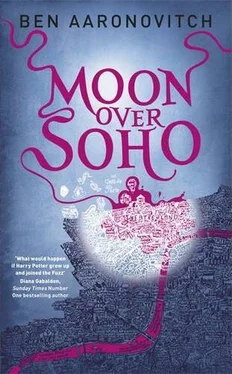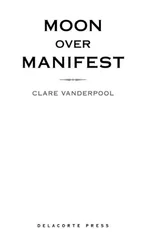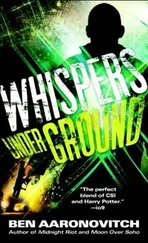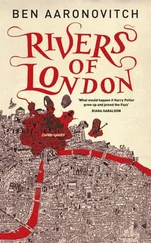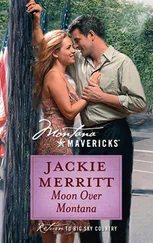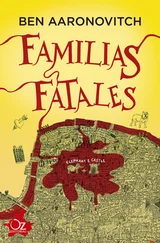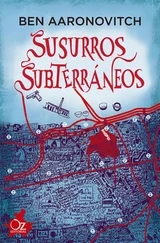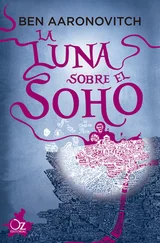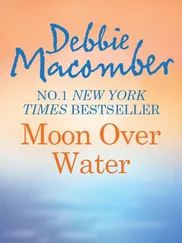“It was two years ago,” said Nightingale.
“Goodness, was it?” asked Postmartin. “Not a very good turnout if I remember.”
“Was he an active practitioner?” I asked.
“No,” said Nightingale. “He got his staff in 1939, wasn’t considered a wizard of the first rank, gave it up after the war and took up a position at Magdalen.”
“Teaching theology of all things,” said Postmartin.
“Magdalen College?” I asked.
“Yes,” said Nightingale suddenly thinking.
I got there first. “The same college as Jason Dunlop.”
NIGHTINGALE WANTED to head straight for Magdalen but Postmartin suggested a spot of lunch at the Eagle and Child. I thought a sit-down was a good idea because Nightingale was favoring his left side again and looking a bit peaky, to be honest. Nightingale compromised by suggesting that we should meet at the pub after visiting the college. Postmartin suggested that I go with him so that he could fill me in on a few things on the way.
“If you think that’s really necessary,” said Nightingale before I could object.
“I believe it is,” said Postmartin.
“I see,” said Nightingale. “Well, if you feel that’s best …”
Postmartin said he thought it was capital and so we accompanied him back to the car where I introduced him to Toby, who exited the vehicle in a cloud of smell. I suggested that Nightingale take the Jag — that way we’d drive back from the pub and he, at least, wouldn’t be walking.
“So this is the famous ghost-hunting dog,” he said.
“I didn’t know he was famous,” I said.
Postmartin led me down an alleyway so authentically late medieval that it still had a stone culver running down the middle to act as a sewer. “Not that it’s used for its original function,” said Postmartin.
It was busy with students and tourists all doing their best to ignore the cyclists who tried to mow down both with gay abandon.
I asked Postmartin what role he played in the intricate network of mostly unwritten agreements that constituted English magical law enforcement.
“When you and Nightingale write reports, I’m the one who reads them,” he said. “At least those portions that are relevant.”
“So are you Nightingale’s governor?” I asked.
Postmartin chuckled. “No,” he said. “I’m the archivist. I’m in charge of the great man’s papers and the papers of all lesser beings that have stood on his shoulders since. Even Nightingale and you.”
After all that history it was quite nice to turn onto Broad Street, which at least had a few Victorian terraces and an Oxfam.
“This way,” said Postmartin.
“Newton was a Cambridge man,” I said. “Why are his papers here?”
“The same reason they didn’t want his alchemistical works there,” said Postmartin. “Once he was safely dead old Isaac became their shining star of science and reason — I doubt they wanted that picture complicated by what was, let’s face it, a complicated man at the best of times.”
Oxford continued to be solidly Tudor with sudden bursts of Georgian exuberance until we reached the Eagle and Child pub on St. Giles.
“Good,” said Postmartin as we sat down in what he called a “nook.” “Thomas isn’t here yet. One finds it so much easier to have a certain kind of conversation with a sherry in one’s hand.”
When you’re a boy your life can be measured out as a series of uncomfortable conversations reluctantly initiated by adults in an effort to tell you things that you either already know or really don’t want to know.
He had his sherry, I had a lemonade.
“I take it you understand how unprecedented it was for Thomas to take on an apprentice?” asked Postmartin.
“People have made that pretty clear,” I said.
“I think perhaps he should have taken that step earlier,” said Postmartin. “Once it was clear that reports of the death of magic had been greatly exaggerated.”
“What gave the magic away?”
“Thomas aging backward was a bit of a clue,” said Postmartin. “I archive Dr. Walid’s reports and the bits that I understand are … strange.”
“Should I be worried?” I asked. I’d only recently gotten used to the idea that my governor was born in 1900 and had, according to him, been getting young again since the early 1970s. Nightingale thought it might be linked to the general increase in magical activity since the ’60s, but didn’t really want to look a gift horse in the mouth. I didn’t blame him.
“I wish I knew,” said Postmartin. He reached into his pocket and handed me a card. It had Postmartin’s number, email, and, I was surprised to see, Twitter address. “If you have any concerns you can contact me.”
“And if I contact you,” I said. “What will you do?”
“I’ll listen to your concerns,” he said. “And I’ll be very sympathetic.”
It was at least another hour before Nightingale joined us, and I then got to watch him sink a pint of bitter while he outlined what he’d discovered — which was, as far as Nightingale could determine, that Jason Dunlop had had no contact with Geoffrey Wheatcroft while at the university.
Nightingale had at least thought to pick up a printout of every student and lecturer who’d been at Magdalen at the same time as our man Jason. Plus a list of every student who had ever attended a class by Geoffrey Wheatcroft. It added up to a stack of hardcopy of just the right size and thickness for beating a suspect without leaving a bruise — if that’s where your idea of law enforcement took you. If the data was entered into HOLMES it could be automatically crosschecked against any other names that came up during the mundane phase of the inquiry. The Murder Team under Stephanopoulis had at least three civilian workers whose only job was to do that sort of tedious, time-consuming, but totally vital kind of work. What did the Folly have? You can guess what the Folly had, and he wasn’t happy at the prospect.
Postmartin asked what Nightingale planned to do next.
Nightingale grimaced and took another pull on his pint. “I thought I’d retrieve the remainder of library cards from Ambrose House. It’s time to see where the rest of the books came from.”
NIGHTINGALE TOLD me to get off the motorway at junction 5 and we drove through Stockenchurch, which appeared to be a hospital with a rather nice village attached, before turning left onto a B-road, which quickly became a narrow lane that ran between the tall green walls of very old-fashioned hedgerows.
“A large part of the estate is rented to local farmers,” said Nightingale. “The gate is coming up on your left.”
If he hadn’t warned me I’d have overshot. The hedgerow abruptly became a high stone wall broken by a wide wrought-iron gate. I stopped the car while Nightingale got out, followed by Toby, and unlocked the gate with a big iron key. He opened the gate with a standard horror-movie creaking noise and waved me through while Toby made a point of marking the gatepost. I stopped and waited for Nightingale to get back in but he pointed to where the drive turned suddenly behind a stand of trees.
“Meet me around the corner,” he said. “It’s not far.”
He was right: I turned the corner and there was the main building of the school right in front of me. The Jag crunched to a halt on the gravel drive and I got out to have a look.
It had been fifty years since it was occupied, you could tell that. The lawn and the formal beds had reverted to brambles, stinging nettles, toadflax, and cow parsley — I learned those names later in case you’re wondering — and the house was a weathered gray color, its large sash windows boarded shut. I’d been expecting something Gothic but this was more like a Regency terrace that had escaped to the countryside and had shot out in all directions before some cruel architect could round it up and pen it back into its original narrow frontage. It was abandoned but not derelict. I could see the guttering was clear, and there were patches of the roof that had clearly been retiled.
Читать дальше
